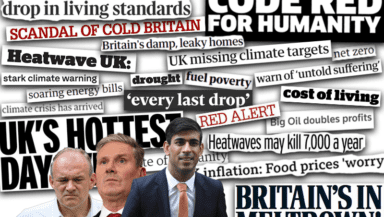Update 8 February 2024: Labour has scaled back its £28bn a year green investment pledge by around 80%.
Reacting to the announcement, Greenpeace UK’s head of politics, Rebecca Newsom, said: “Dropping the pledge would be weak political, economic and climate leadership from Starmer before he’s even got his feet under the table. This is a vision worth fighting for, not retreating from.” Read Greenpeace’s full reaction.
Back in 2021, Labour Shadow Chancellor Rachel Reeves said she’d be Britain’s first “Green Chancellor”. Labour’s annual conference that year even had the tagline “A fairer, greener future”.
Reeves proudly announced that a Labour government would invest £28 billion a year in green capital investment, every year, until 2030.
This level of investment could upgrade a lot of the UK. Our homes, public transport, sewage systems, the electricity grid. It could be spent on giga-factories to build batteries for electric vehicles and plant more trees across the country.
And it would pay for itself over time by creating jobs, boosting the economy, and bringing huge benefits to society.
Labour’s £28 billion promise is bold and visionary – but it’s at risk
In the summer of 2023, Reeves said the £28 billion-a-year plan to upgrade the UK might not be delivered immediately under a Labour government. And further reports in September suggested the amount of investment might be cut back.
Labour is failing to confidently present the clear benefits of green investment, in response to attacks from the Conservatives and right wing media.
But as anyone in business knows, you have to spend money to make money. And as anyone in the UK knows, the country requires urgent investment.
Yesterday’s Autumn Statement debate in Parliament was another opportunity for Reeves to set out more detailed plans for the £28 billion. Instead, it didn’t get a mention.
Reeves must stand firm in her economic analysis of 2021 – that green investment is good for the UK, popular, and needed urgently.
How Labour’s £28 billion a year could transform the UK
1. Warmer homes and lower bills
The UK has some of the oldest and draughtiest housing stock in Western Europe. Buildings are the UK’s second highest-emitting sector, accounting for 17% of total emissions in 2022.
Using more energy than necessary to heat our homes is pushing up bills.
The next government must focus on reducing the amount of energy we waste through a national energy efficiency programme. A government-funded insulation scheme would help keep homes warmer in winter and cooler in summer, saving money and lives.
2. Clean and affordable transport
Electric vehicles are essential for reaching net zero. They’re nice to drive, and cheaper to run. But few people can afford a new electric car, and there aren’t enough charging points around the country.
Labour could scale up charging infrastructure and support investment in 10 battery gigafactories by 2040, the amount experts say is needed.
Our failing public transport system could also be completely transformed with proper investment to expand and electrify bus and train services across the country.
Transport is the UK’s highest-emitting sector, contributing 23% of total UK emissions in 2022. Upgrading transport would also massively improve air quality.
3. UK energy security
Over-reliance on fossil fuels is behind our skyrocketing energy bills. Renewable energy is much cheaper – at one point last year, wind was nine times cheaper than gas.
The UK has vast untapped access to wind, solar and tidal power. But years of neglect means we’re stuck in a ridiculous situation. Renewable energy projects are waiting around fifteen 15 years to connect to our outdated electricity grid.
Labour’s £28 billion could fund greener, cheaper renewable energy and grid upgrades. This would mean real, homegrown energy security.
Green investment pays for itself – and it’s a vote-winner
Committing the £28 billion a year would fix all these issues, and create an engine of prosperity for the future. The US, the EU and China are already making huge investments in green industry and infrastructure. And they’re already reaping the rewards – from more jobs to better public transport.
In 2021, Reeves accepted that the costs of waiting to tackle the climate crisis would far outweigh the costs of acting now.
And when it comes to government spending, £28 billion a year is a drop in the ocean compared to the costs of doing nothing – not least to the NHS. Cold homes, “warm banks”, sewage in our beauty spots, flooding, air pollution – all are racking up costs for future taxpayers.
Finally – no other major political party is offering anything close to this level of investment in green infrastructure. According to our polling, many in the UK’s most marginal constituencies want to see stronger action on climate, including support for many of the policies above.
Labour’s £28 billion could be what sets them apart from other major parties, while the Green Party is pledging £100 billion per year.
So it’s a clear vote winner for parties willing to be bold, like Labour – if they are strong enough to stand by it.



